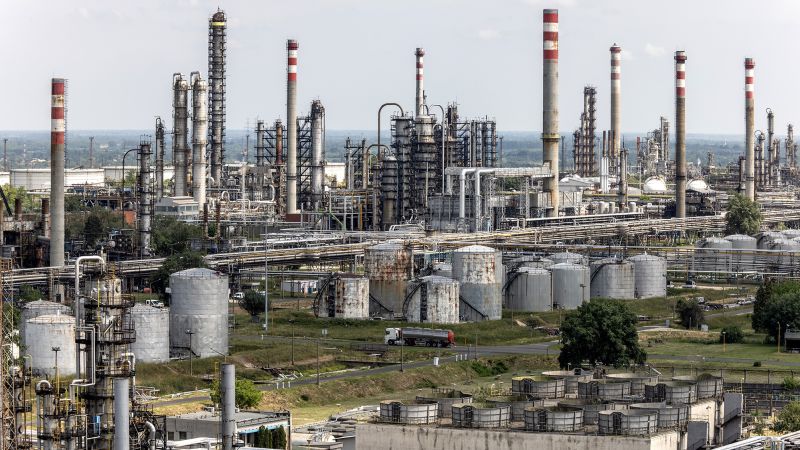Oil and gas producers must confront a “pivotal” choice: continue to accelerate the climate crisis or become part of the solution, the International Energy Agency said in a report Thursday.
The industry currently accounts for only 1% of global investment in clean energy, and continues to pump out disastrous quantities of planet-heating gases, including methane, which is roughly 80 times more potent than CO2 in the near term. If the world is to stand any chance of limiting the rise in global temperatures to 1.5 degrees Celsius above pre-industrial levels, drastic action is needed on both fronts, and fast, the IEA said.
The warning comes ahead of COP28, a United Nations climate summit starting next week, and as a recent UN analysis shows that the planet is set to heat up by nearly 3 degrees Celsius by the end of this century. Scientists predict that warming of that scale could push the world over a number of catastrophic and potentially irreversible tipping points, such as the collapse of the polar ice sheets.
“The oil and gas industry is facing a moment of truth at COP28 in Dubai,” IEA Executive Director Fatih Birol said in a statement. “With the world suffering the impacts of a worsening climate crisis, continuing with business as usual is neither socially nor environmentally responsible.”
Introducing the report, entitled “The Oil and Gas Industry in Net Zero Transitions,” Birol told journalists Thursday there are two measures the industry must take to play its part in limiting global warming to the internationally agreed level of 1.5 degrees.
The first is reducing planet-heating pollution from its own operations, such as extracting oil and gas from the ground, processing the fuels and delivering them to consumers. These three activities generate nearly 15% of global energy-related greenhouse gas emissions.
“These emissions, including methane emissions, we know that they can be fixed rather easily, quickly and in many cases in a cost-effective manner,” Birol said.
This pollution needs to be cut by more than 60% by 2030 from today’s level, the IEA report says.
The second measure the agency recommends is a dramatic ramp-up in investments in renewable energy by oil and gas companies, which have been “a marginal force” in the clean energy transition, the report said.
The industry invested around $20 billion in clean energy projects last year — only around 2.5% of its total capital spending, the IEA found. That share would need to shoot up to 50% by 2030 to help keep global warming to the less dangerous level of 1.5 degrees.
Such an increase would mean a radical change in how oil and gas firms spend their cash. Between 2018 and 2022, the industry generated around $17 trillion in revenue: 40% was spent developing and operating oil and gas assets, 10% went to investors and just a fraction was invested in clean energy, according to the IEA report.
Oil and gas companies have been investing in carbon capture technologies to remove carbon pollution from the air and to capture what’s produced by power plants and industrial facilities. The captured carbon can then be stored or reused. But carbon capture is “not the answer,” Birol told reporters.
The techniques can play an important role in certain sectors such as the production of cement, iron and steel among others, he said.
“But to say that the carbon capture and storage technology would allow the oil and gas industry to continue with the current oil and gas production trends and at the same time bring the emissions down… is, in our view, a pure fantasy.”
Limiting the temperature rise to 1.5 degrees would require capturing “an entirely inconceivable” 32 billion metric tons (35 billion short tons) of carbon by 2050, the IEA said. The amount of electricity needed to power this process would exceed current global annual electricity demand.
Commenting on the IEA report, Kaisa Kosonen, policy coordinator at Greenpeace International, said: “Industry self-regulation leads to collective disaster, so the real moment of truth will come at this year’s climate summit when governments have the chance to agree to make fossil fuels history, in a fair and fast manner.”
Read the full article here













